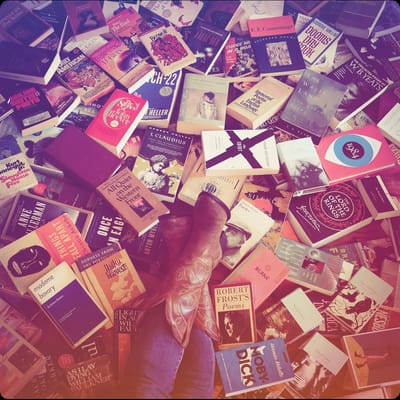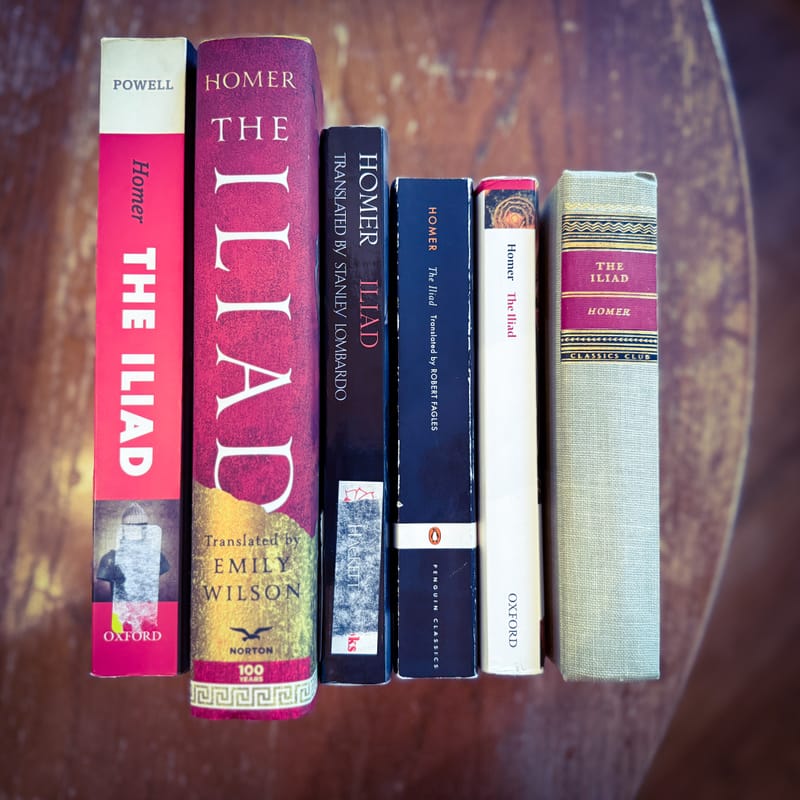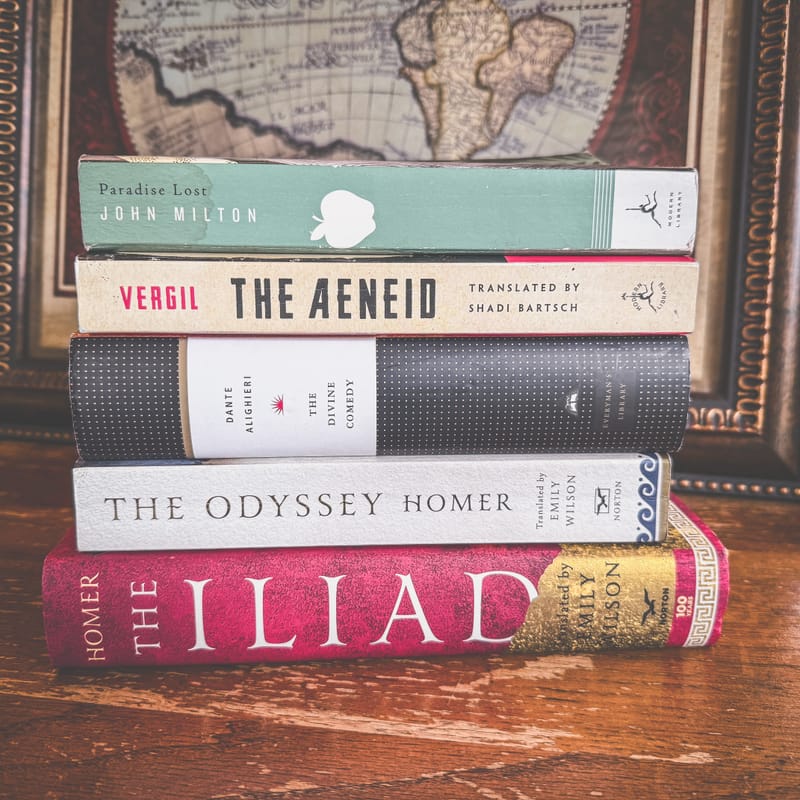I read The Iliad for fun. It didn’t go as planned. It was so much better.
The Iliad was the first book of the "Epic, Epic Poetry Project"- a personal challenge to read the greatest epic poems back-to-back.
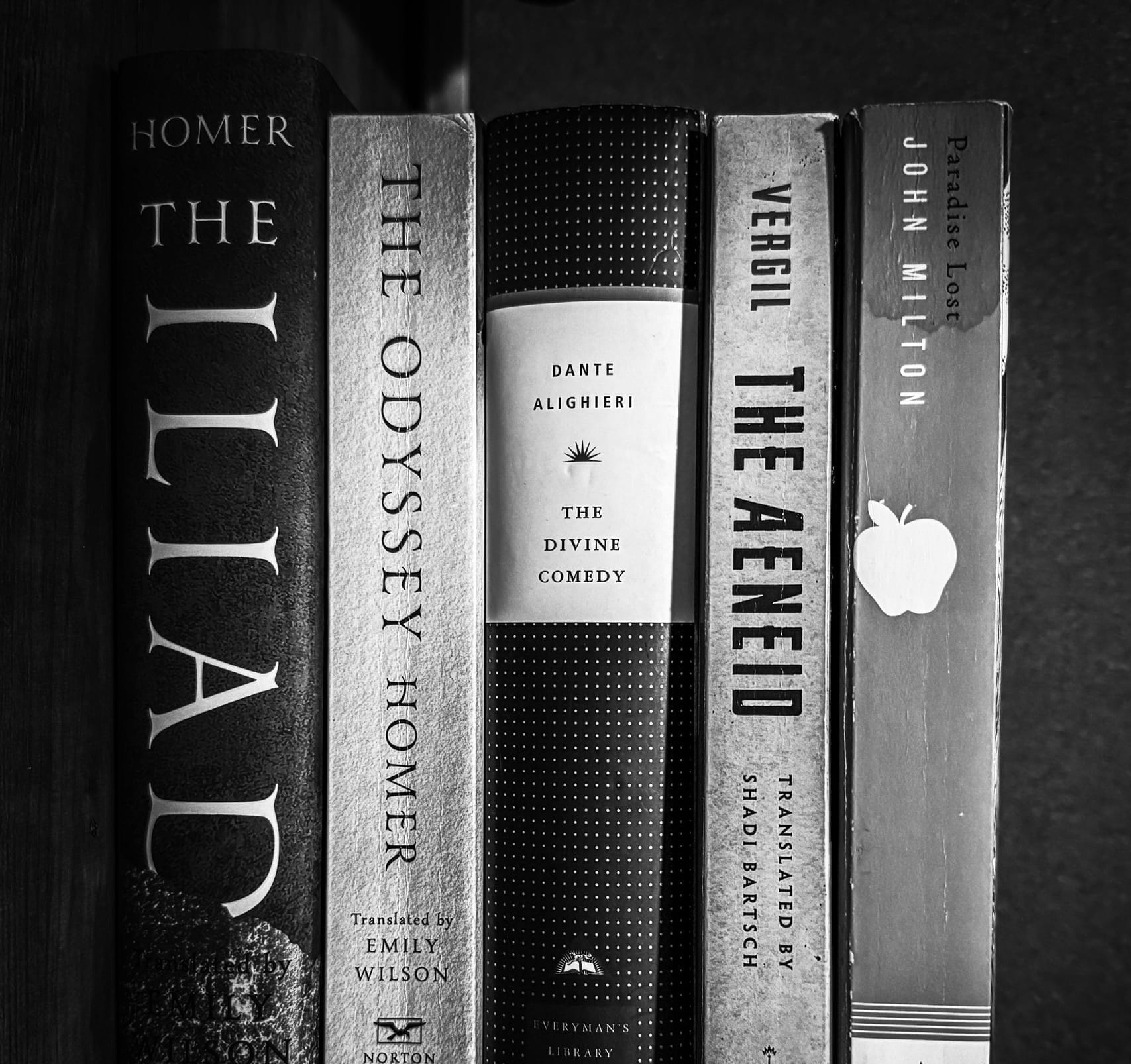
Going into it, I only knew that it was about the Trojan War. And since I don't typically enjoy war stories, I expected to slog through it just to get to The Odyssey (which I knew was an adventure).
What actually happened surprised me: I absolutely loved it.
What Surprised Me About The Iliad
Not What I Expected
The imagery, the vividness, the characters, and above all, Homer’s language. Those similes! That rhythm! From the first book - with Achilles fuming with rage, Chryses pleading for his daughter, Apollo descending down the mountain like night to decimate the Greeks, Athena yanking Achilles back by the hair - the story hooked me. And those Greek gods! They meddle, interfere, vanish, and return, constantly stirring the pot. Everything felt visceral and immediate.
I expected The Iliad to be difficult to read. Violent. Ancient. Maybe even a little boring. Instead, the words created a vivid, living reality that was like being inside a movie (but better, because it lived inside my mind!). The emotion and intellect it stirred were immense. I was wrong about this book.
This is a war poem. But it’s not really about war. It’s really about humanity.
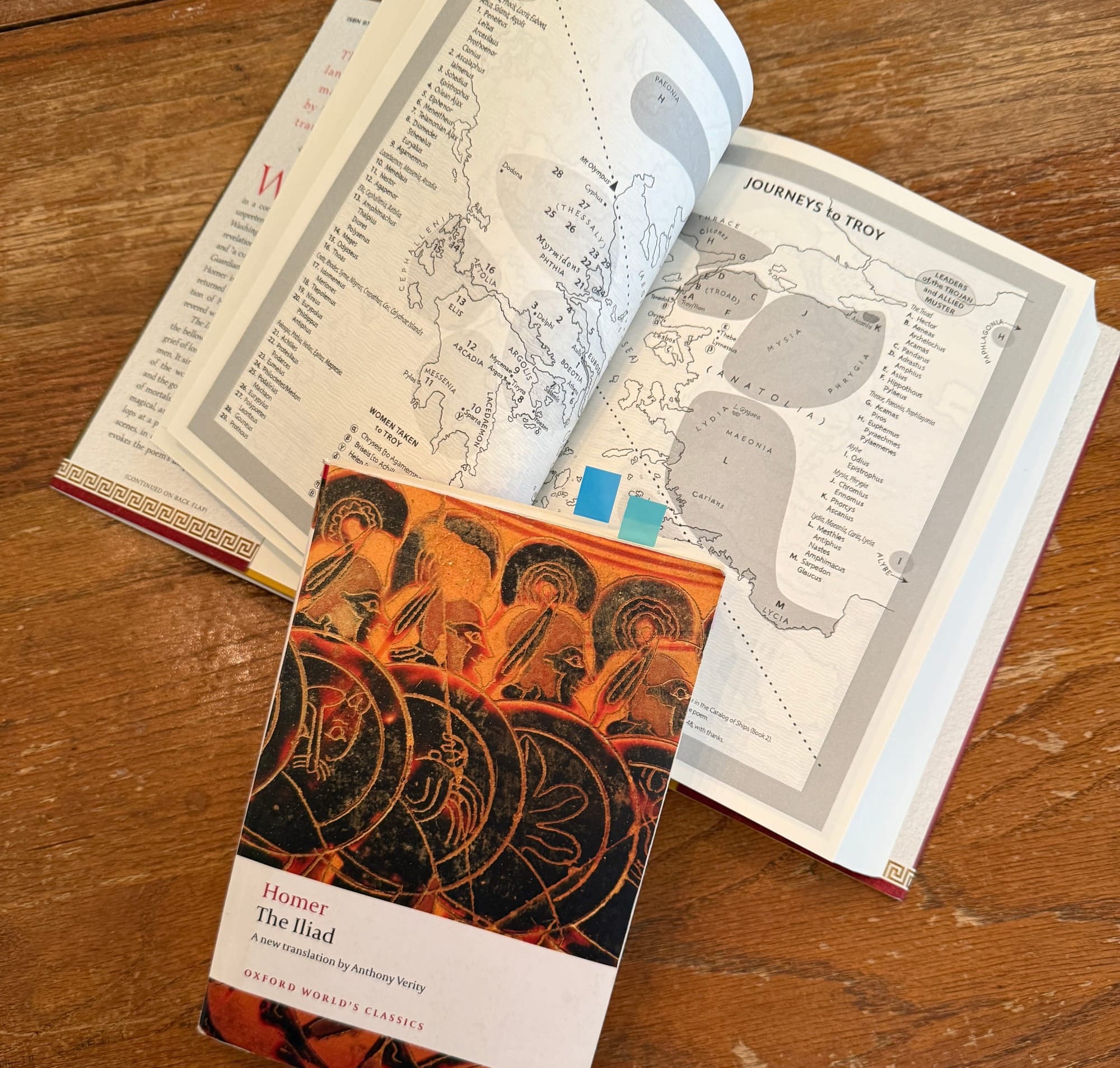
The Emotional Impact
How fresh, real, and vivid everything felt. The grief, rage, longing, shame, and honor still resonate. I didn’t expect to feel emotional attachment to Hector. Or to be annoyed by Diomedes. Shocked by Achilles. Or to root for the Trojans too.
The Poetic Language
Homer’s language, even in translation, stunned me. The similes were awesome: the connection of visual imagery that I would never have thought about or paired together.

The Gods
The gods? Mischievous, petty, powerful, hilarious. For me, in the beginning, Hera and Athena were constant sources of frustration. Yet, they made the story sparkle. Silver-footed Thetis, earth shaker Poseidon with his dark-blue hair, as well as Hephaestus and his craftsmanship, and always, Zeus. They were quite powerful, immersed in the lives of the humans but also detached at times. And always scheming and fighting among themselves as well. In this way, they were very human.
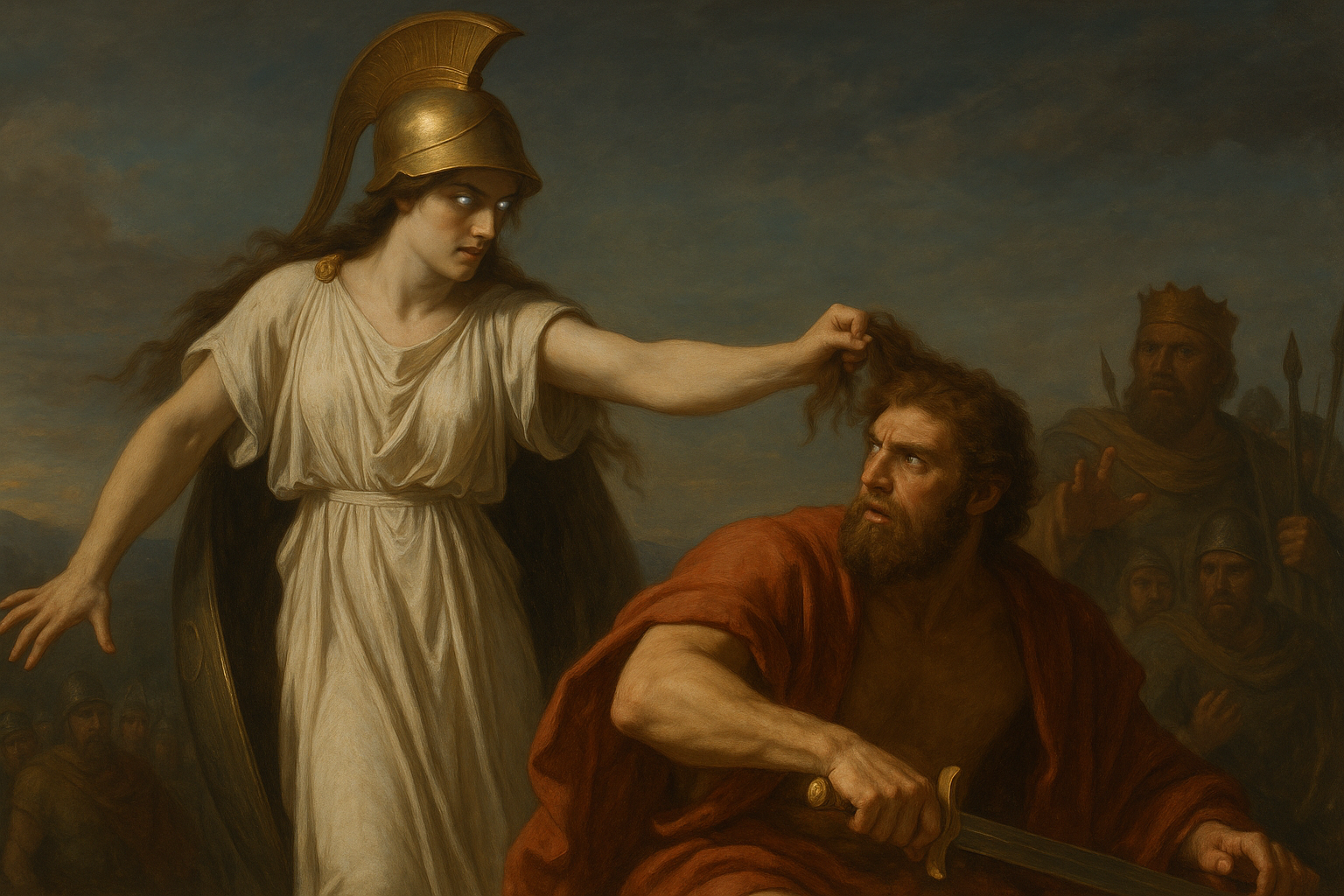
Old (and New) Testament Similarities
It shouldn't surprise me as they are both from the ancient world, but it did surprise me to find so many echoes between Homer and the Bible.
Having read the entire Bible and thus having some familiarity with it, the similarities in certain phrasing of things (animal sacrifices, divine face-to-face moments, and more) in The Iliad really struck me.
I suppose, in my mind, these were special and unique to the Jewish people and early Christians. However, it is simply unique to the ancient world.
It was fascinating. I will share a few with you.
(Unless otherwise noted, all references come from The Oxford World's Classic edition, trans. by Anthony Verity)

Of One Mind
In Book 4 of the Iliad (lines 360 - 361) it reads:
"...because I know that the spirit which you keep in your breast
is kindly disposed; and your thoughts are my thoughts."
This reminds me of St. Paul in the New Testament:
"...being like-minded, having the same love, being of one accord, of one mind." (Philippians 2:2, NKJV)
and also here:
"...be no divisions among you, but that you be perfectly united in mind and thought." (from 1 Corinthians 1:10, NIV)
Separating the chaff

In book 5 (lines 499-501) it reads:
"sacred threshing-floor a wind carries the chaff away
when men are winnowing, at the time when fair-haired Demeter
separates grain and chaff"
Which of course made me think of this in the New Testament state by John the Baptist:
“His winnowing fork is in his hand, and he will clear his threshing floor, gathering his wheat into the barn, but the chaff he will burn with unquenchable fire.” (Matthew 3:12 / Luke 3:17)
Face-to-Face
In The Iliad, in Book 8 (line 200) Hera goes to speak with Poseidon and is says:
"She spoke to the huge god Poseidon, face to face..."
The statement "face to face" again brought to mind the Old Testament mentioning see God face to face:
- “So Jacob called the name of the place Peniel, saying, ‘For I have seen God face to face, and yet my life has been delivered.’” (Genesis 32:30, NIV)
- “The Lord would speak to Moses face to face, as one speaks to a friend.” (Exodus 33:11, NIV)
and the term "face-to-face" again shows up in the new testament:
- “For now we see through a glass, darkly; but then face to face…” (1 Corinthians 13:12, NIV)
From what I’ve noticed, the term ‘face to face’ is used more often in reference to gods or God than to human interactions.

Wine and Bread
Book 8 (lines 506-7) reads:
"...supply yourselves with mind-cheering wine and bread"
This may be a stretch, but the line stood out to me, and immediately reminded me of the Old Testament. Specifically Psalm 104:
- "...wine that gladdens human hearts, oil to make their faces shine, and bread that sustains their hearts." (Psalm 104:14-15, NIV)
In thousands of years, some things never change. Wine still cheers the heart and lifts the mind. Bread, though? In today’s gluten-fearing, carb-avoiding world, it’s practically a scandal.
Diverse Gifts
In Book 13, lines 730- 735:
"A god gives prowess in war to one man, and to another
skill in the dance, and to a third the lyre and song,
and in another’s breast wide-thundering Zeus sets an excellent
understanding, and many men derive benefit from it;
he is the salvation of many, and he himself knows this best."
As soon as I read that it made me think of this in the New Testament
- "There are diversities of gifts, but the same Spirit. There are differences of ministries, but the same Lord. And there are diversities of activities, but it is the same God who works all in all. But the manifestation of the Spirit is given to each one for the profit of all: for to one is given the word of wisdom through the Spirit, to another the word of knowledge through the same Spirit, to another faith by the same Spirit, to another gifts of healings by the same Spirit, to another the working of miracles, to another prophecy, to another discerning of spirits, to another different kinds of tongues, to another the interpretation of tongues. But one and the same Spirit works all these things, distributing to each one individually as He wills." (1 Corinthians 12:4-11, NKJV)
Expression of Grief
In Book 18 (lines 28-33) in the Emily Wilson translation, Achilles's despair is described:
"At this, a black cloud of despair engulfed Achilles. With both hands he scooped up fistfuls of soot and dust and poured it on his head, and rubbed the dirt across his handsome face. Black ashes settled on his scented tunic. He stretched his whole long body in the dust and lay there. With both hands, he tore his hair."
It reminded me of how grief is expressed in the Bible as well: ashes and dust, sackcloth, torn garments, even the pulling of hair. Ancient sorrow had weight, texture, ritual.
The End (Spoilers Ahead!)
DO NOT READ IF YOU HAVEN'T READ THE ILIAD YET.
This also surprised me: the Trojan Horse does not make an appearance in The Iliad. We hear about it in The Odyssey. If you were to ask any person what is a Trojan horse, they always know about this story. But, it wasn't in The Iliad at all. In fact, we don't even see the end of this war by the end of this book.
Also, Achilles doesn’t die in this poem. I felt a little bit relieved at not have to see Achilles killed on the battlefield. I knew it was going to happen, but I didn’t have to ‘watch’ it happen. And I was kind of happy about that.
The story ends not with a triumphant final battle and winning side but with Hector’s death and funeral. And, in a way, I feel like that was almost anti-climatic. It wasn’t a big powerful ending for such a big powerful story. That surprised me. And yet, I still loved the ending as well.
As soon as I finished The Iliad I wanted to go back and read it again immediately. I wanted to experience it again. I was not ready to let go. And that surprised me most of all.
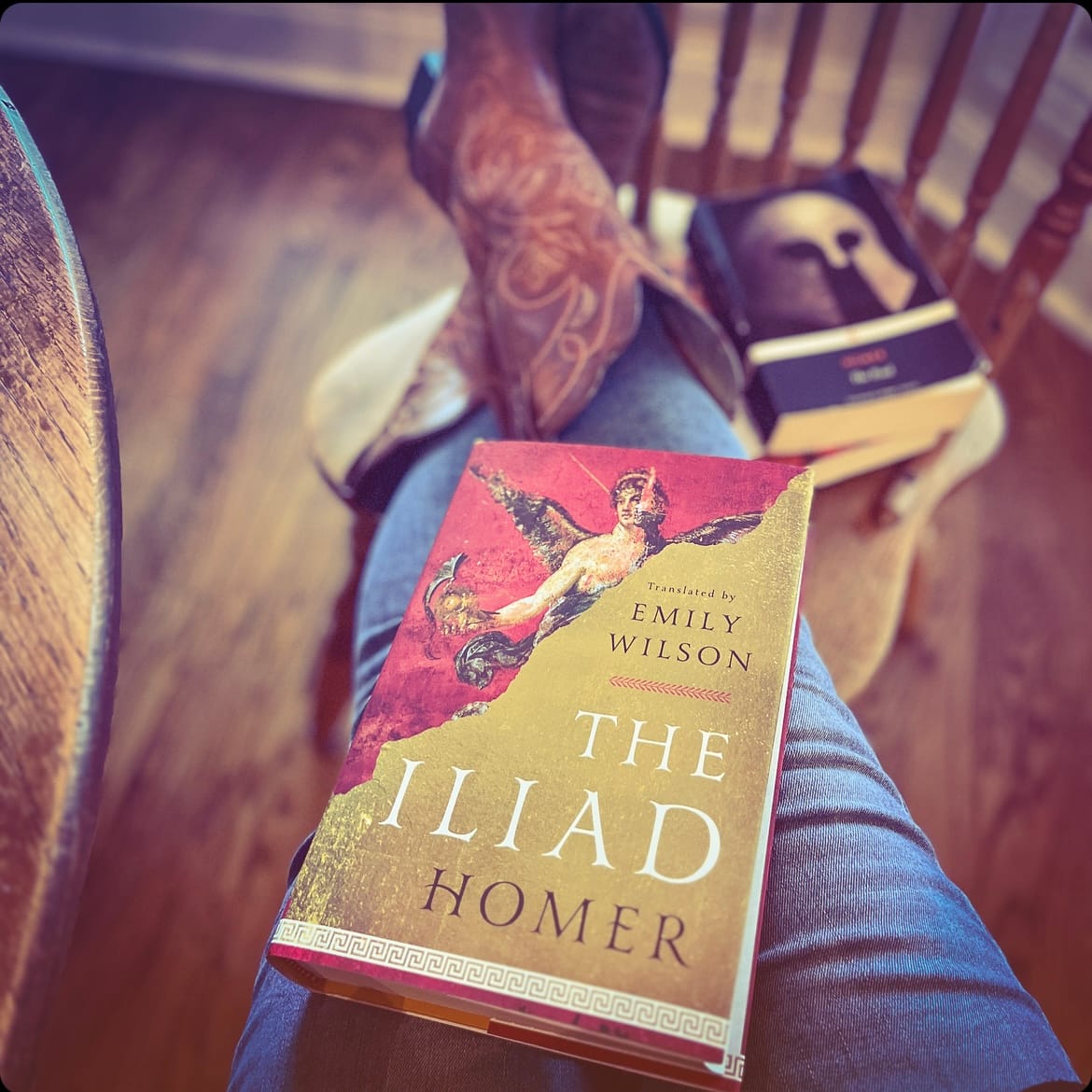
As I said at the beginning, I read The Iliad for fun.
Let me tell you what happened while I was reading it.
I was in a waiting room, completely immersed in my gorgeous new hardback, when an older woman came over and asked what I was reading.
I held it up and said, "The Iliad."
She gave me a sympathetic look and said, "Oh, honey, do you have to read that for school?" I smiled and said, "No. Just reading it because I wanted to."
It was so good, and I was so captivated, that her sad tone caught me off guard.
Apparently, The Iliad still has a reputation. One I don't think it really deserves.
Next, In Part Two
I’ll share how the different translations shaped my reading and what I learned from comparing them. And, why you should read the way that works best for you.

